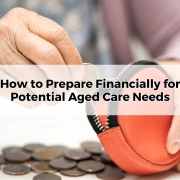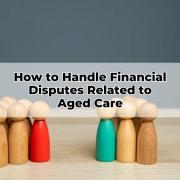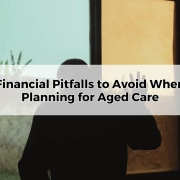How do I plan for estate distribution during aged care?
Table of Contents
TogglePlanning for the future can be daunting, especially when considering aged care and its impact on your financial security. Understanding how aged care costs and government support interact with your estate is crucial. This blog post aims to shed light on these concerns and guide you through essential steps to ensure your wishes for asset distribution are clear and protected.
Entering aged care presents unique challenges. You may worry about how it will affect your loved ones financially, or how best to preserve your hard-earned assets. Proactive planning can alleviate these anxieties and empower you to navigate this transition with confidence.
Understanding the Impact of Aged Care on your Estate
Now that we’ve set the stage, let’s delve deeper into the financial aspects of aged care in and how they impact your estate.
Variety of Choices, Varied Costs
Different facilities
From home care packages to residential aged care homes, each option carries distinct costs. Understanding these differences helps you plan accordingly.
Government Support
The Australian Government offers support through Centrelink Age Pension and other benefits. However, an assets test might affect your eligibility.
Residential Aged Care Deposit (RAD)
This one-time contribution towards your accommodation can significantly impact your estate size. Knowing the rules and exemptions helps you plan strategically.
Breaking it Down
Centrelink Age Pension
This valuable resource can contribute towards aged care costs, but remember, assets tests apply.
RAD and its Impact
While the RAD helps secure your place in an aged care home, it reduces the assets passed on to your loved ones. Understanding the exemptions, like the principal home exemption for eligible partners, can lessen the financial burden.
Essential Estate Planning Documents
Now that we’ve explored the financial landscape of aged care, let’s equip you with essential tools: estate planning documents. Just like having a map before a journey, these documents provide clarity and direction for your wishes regarding your estate.
Your Will
Think of your Will as your roadmap, outlining how you wish your assets (like your home, savings, and belongings) to be distributed after your passing. A valid Will ensures your desires are followed, minimising confusion and potential disputes among loved ones.
Enduring Power of Attorney (EPOA)
Imagine facing a situation where you’re unable to manage your finances due to illness or incapacity. This is where the EPOA steps in. This document appoints a trusted individual (your “attorney”) to make financial decisions on your behalf, ensuring your bills are paid and investments are managed according to your wishes.
Advance Care Directive (ACD)
Your ACD, also known as a living will, allows you to express your preferences for medical treatment in advance. This crucial document ensures your healthcare decisions align with your values and beliefs, even if you cannot communicate them yourself.
These documents are vital, but navigating their complexities can be challenging.
Strategies For Minimising Impact on your Estate
Now, let’s explore strategies to minimise the impact of aged care costs on your estate, ensuring more for you and your loved ones. Remember, each situation is unique, and personalised advice is key. However, these general strategies can offer valuable insights.
Gifting with Care
Strategic gifting: Consider transferring some assets to loved ones well in advance. However, be mindful of Centrelink assets testing rules and potential tax implications.
Unlocking Equity
Reverse Mortgages: This option allows you to access the equity in your principal home to fund aged care costs. While it has benefits, understand the interest accrual and potential impacts on inheritance.
Downsizing Wisely
Rightsizing your home: Moving to a smaller home can reduce your RAD contribution and free up funds for other needs. Remember, downsizing involves emotional and logistical considerations. Consult with trusted advisors and family members throughout the process.
These are just a few initial ideas. Seeking personalised advice from an experienced Aged Care Financial Adviser is crucial.
Planning for aged care and estate distribution might seem daunting, but remember, you’re not alone. This journey requires knowledge, preparation, and sometimes, a helping hand.









